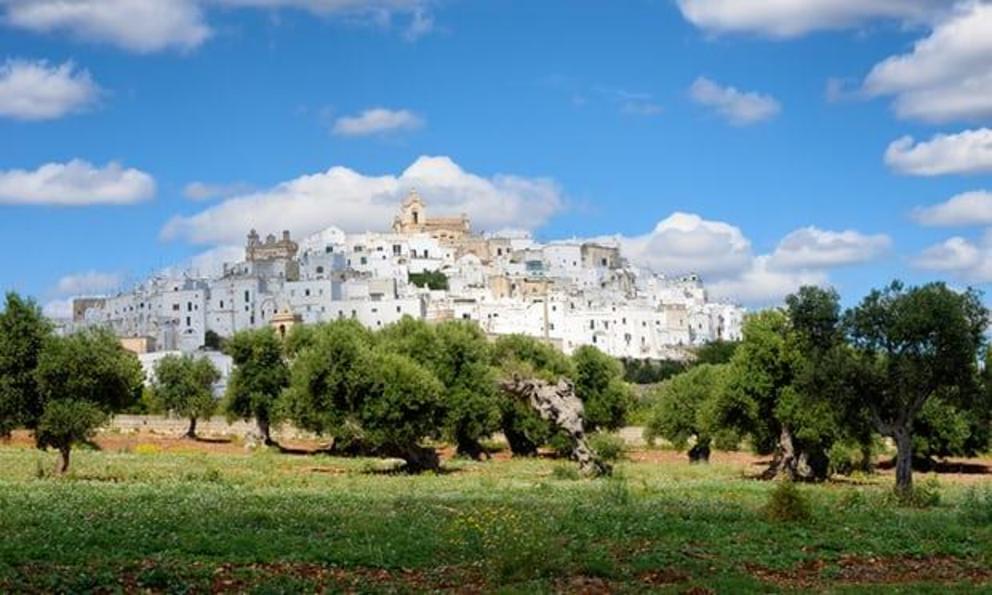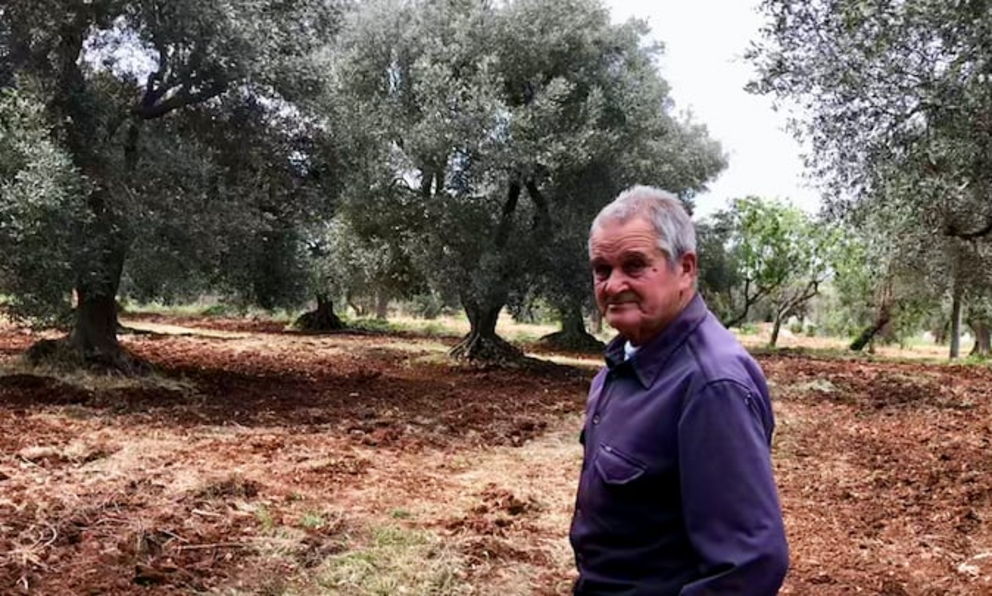Italy’s farmers turn to cow dung to save beloved olive trees
Ciccio Manelli, 81, who owns hundreds of ancient olive trees in the southern Italian province of Brindisi, burst into tears when contemplating the prospect of his precious trees being uprooted.
“My life is being destroyed,” he said. “An infected olive tree was found on another farmer’s land and now they want to come and uproot mine, even if they’re not sick. I grew up among these fields. These trees are my family.”
Manelli’s olive trees are healthy –but another, in his neighbour’s field, is not. That spells trouble for him, as authorities in the south-eastern Puglia region pursue a zero-tolerance policy to combat the spread of a blight they fear could ruin the local olive oil industry, one of the largest in Europe. Since 2015, any olive tree within 100 metres of one affected by Xylella fastidiosa, a pathogen that inhibits the movement of water and nutrients in woody plants, has to be uprooted, whether it is sick or not.
More than 5,000 sq km of land – an area almost three times the size of London – has been classified as “infected”, and 11 million olive trees could be uprooted. But faced with angry farmers who say the strategy is unjust and threatens their livelihoods, scientists are trying to find another way. An independent group of researchers working in Puglia believe other factors are causing desiccation in the region’s trees, and that the most effective way of combating it lies in a natural remedy used by generations of local farmers.
The only thing to do when a bacterium has spread is to find a way to live with it and strengthen trees - Professor Marco Scortichini
“Recent studies discovered that Xylella is likely to have been in Puglia for some time and that most plants are healthy hosts,” said Dr Margherita D’Amico, head of a team of bacteria experts seeking a cure. “Xylella can be one of the factors that causes decline in trees that are already debilitated by a series of other issues such as fungi, poor soil, and neglect, which must be addressed in ways other than felling.”
D’Amico’s team is based in the town of Galatone, southern Puglia. This area is at the centre of the epidemic, and the landscape is dominated by desiccated or uprooted trees and barren fields. She said the majority of the scientists proposing dramatic and damaging solutions to the crisis were virologists, rather than plant pathologists like her and her colleagues. “They are demanding that farmers apply the same protocols one would to the spread of a virus: uprooting all infected plants, control of the vector insect, and use of resistant plants. But Xylella is a bacterium, not a virus.”
 Olive groves surround the city of Ostuni in Puglia.
Olive groves surround the city of Ostuni in Puglia.
Xylella is spread by the spittlebug, which produces a saliva-like secretion and is described as a “hitchhiking pest” because it spreads the bacterium by moving from tree to tree and, according to the authorities, causes the desiccation of the plants. D’Amico’s solution is a combination of pruning a tree’s dry branches, cleaning infected branches with copper sulphate, treating the trunk with iron sulphate, and fertilising the ground with an organic mixture made chiefly of cow manure.
Professor Marco Scortichini, a bacteriologist from the University of Campania in Caserta, near Naples, who has conducted several studies of Xylella, agreed: “Natural remedies work. The only thing to do when a bacterium has spread is to find a way to live with it and strengthen trees so they are less vulnerable.’’
Not everyone agrees. Giovanni Martelli, a plant virologist at the University of Bari, who has conducted studies for the authorities and supports uprooting, said: “People who claim that Xylella can be treated with natural remedies are not right. There is no cure for Xylella. The immediate removal of infected trees and surrounding healthy trees is an indispensable measure to block the spread.”
Following an Italian government decree in 2014, the EU and the Rome government have allocated millions of euros to studying the phenomenon, and to uprooting infected trees. In 2015, France banned imports from Puglia of products that could carry the pathogen. Since the start of the crisis, olive oil producers have lost more than €1bn, according to Italy’s largest agricultural association, Coldiretti.
But D’Amico insists the natural approach offers hope for farmers. This year, the trees under her care have already flowered and will produce fruit in October. So will other trees infected by Xylella near the Puglian towns of Avetrana and Martina Franca, in the southern province of Taranto.
“They told me there is a way to treat Xylella,” said Manelli. “I really hope the authorities change their mind. I’m old, and when I leave this world, I want to be sure my trees will still be here.”

